Search result16 results
-

DOES CEOS’ PRIOR EXPERIENCE IN GLOBAL JOURNAL OF FAMILY CRISES MATTER FOR FAMILY FIRMS IN THEIR NEXT CRISIS? EMOTIONAL AND RATIONAL ADVANTAGES ACROSS CULTURAL CONTEXTS
María Iborra, University of Valencia José Fernando López-Muñoz, ESIC Business & Marketing School Vicente Safón, University of Valencia & Ivie Members of the STEER research group (Strategy, Top Executi- ves, ESG and Resiliency) and collaborators of the Chair of Family-Owned Business (CEFUV)
(2025). Recurs electrònicThis research note analyses why some family businesses manage to adapt better during global crises. The proposition is clear: having a CEO who has successfully dealt with a previous crisis, such as the one in 2008, can improve the company's performance in new situations of uncertainty, such as COVID-19. Two types of advantages are identified: a rational one, related to a greater ability to drive digital transformation and align strategy with the changing environment, and an emotional one, based on reinforcing the family's identification with the company thanks to that previous experience. Moreover, the impact of the CEO varies according to the cultural context: it is stronger in countries...
This research note analyses why some family businesses manage to adapt better during global crises. The proposition is clear: having a CEO who has successfully dealt with a previous crisis, such as the one in 2008, can improve the company's performance in new situations of uncertainty, such as COVID-19. Two types of advantages are identified: a rational one, related to a greater ability to drive digital transformation and align strategy with the changing environment, and an emotional one, based on reinforcing the family's identification with the company thanks to that previous experience. Moreover, the impact of the CEO varies according to the cultural context: it is stronger in countries with individualistic cultures, where individual leadership has greater weight.
Read more Hide -
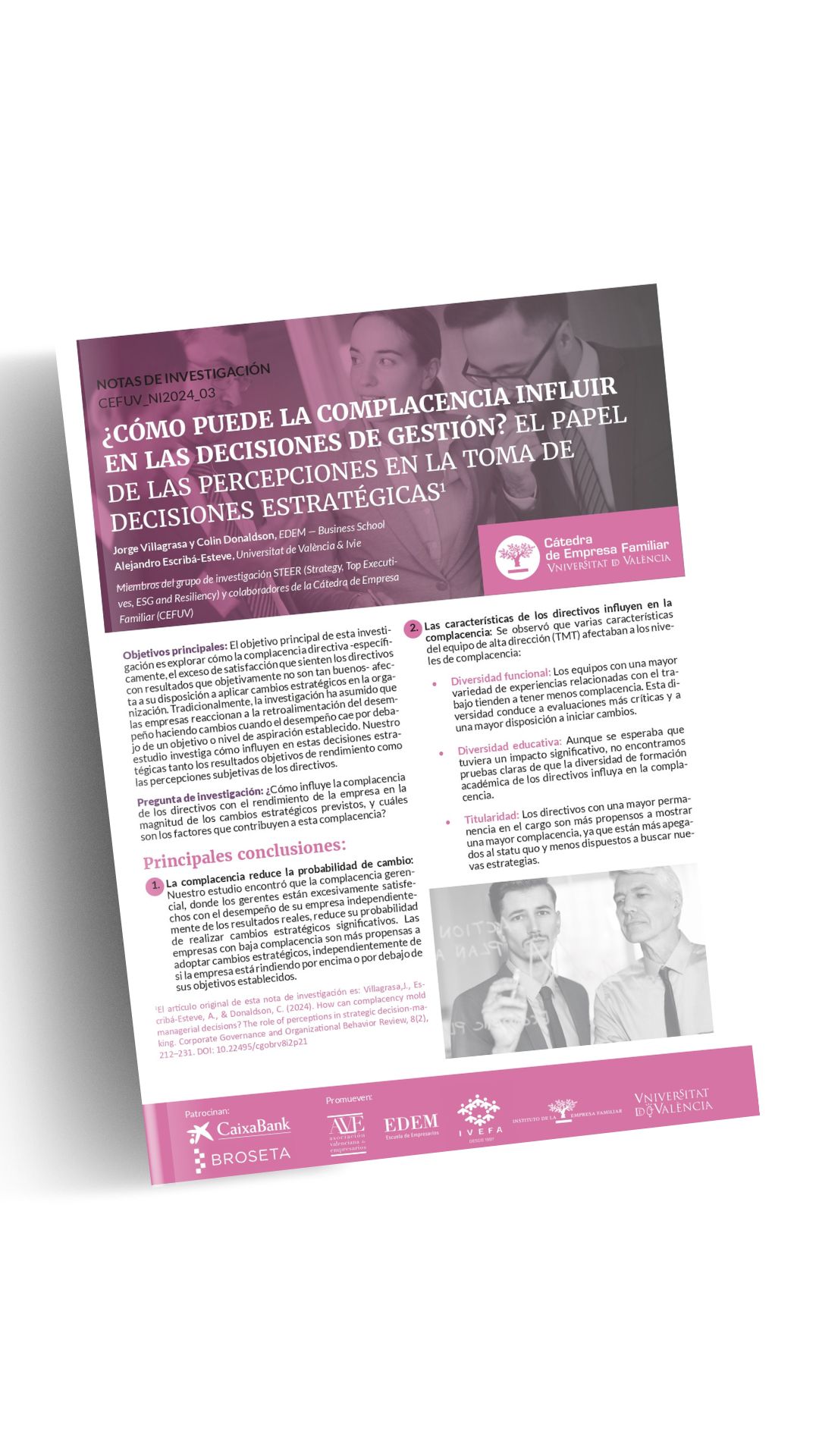
HOW CAN COMPLACENCY INFLUENCE MANAGEMENT DECISIONS? THE ROLE OF PERCEPTIONS IN STRATEGIC DECISION-MAKING
Jorge Villagrasa, EDEM Business School Colin Donaldson, EDEM Business School Alejandro Escribá-Esteve, Universitat de València & Ivie Members of the STEER research group (Strategy, Top Executives, ESG and Resiliency) and collaborators of the Chair of Family Business (CEFUV)
(2024). Recurs electrònicThe concept of complacency (leaders' excessive satisfaction with business performance) and its effects on the willingness to make strategic changes, even when actual results are not favourable. Factors such as functional diversity decrease complacency, while seniority increases it. Encouraging diverse teams, challenging satisfaction with current performance and encouraging leaders to remain open to change are recommended to drive organisational adaptability.
-

THE FINANCIAL SOUNDNESS OF FAMILY FIRMS DURING CRISES: DOES ‘FAMILIARITY’ MATTER?
Jorge Villagrasa; Colin Donaldson, EDEM Business School Alejandro Escribá-Esteve, Universitat de València & Ivie Esther Sánchez-Peinado, Universitat de València Members of the STEER research group (Strategy, Top Executives, ESG and Resiliency) and collaborators of the Chair of Family Business (CEFUV)
(2024). InformesThe study analyses whether family firms have greater financial strength than non-family firms during economic crises, such as the 2008-2009 crisis and the COVID-19 pandemic. Based on an analysis of 137 Spanish SMEs, it concludes that family businesses stand out for their resilience due to their long-term focus, cautious risk-taking and the goal of preserving their legacy. Neither internationalisation nor diversification significantly alter this strength. Moreover, the education and age of management teams in family firms reinforce their financial stability.
-
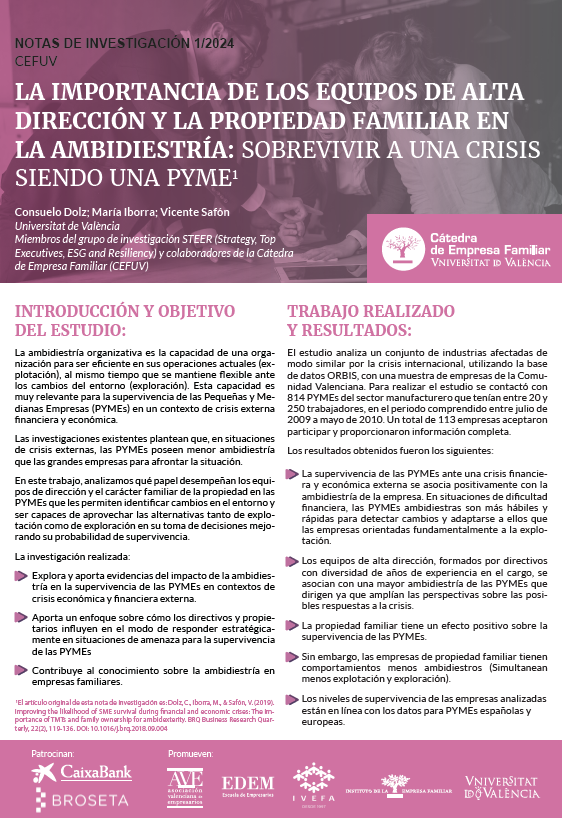
The importance of management teams and family ownership in ambidextrousness: surviving a crisis as an SME
Consuelo Dolz, María Iborra and Vicente Safón (Members of the STEER research group (Strategy, Top Executives, ESG and Resiliency) and collaborators of the Family Business Chair (CEFUV).
València , 2024. Recurs electrònicFind out how Small and Medium Enterprises (SMEs) can successfully face and overcome economic crises. Our research highlights the vital role of organisational ambidestry, diverse top management teams and the influence of family ownership in this process. Explore more about our findings and their impact on business survival here.
-
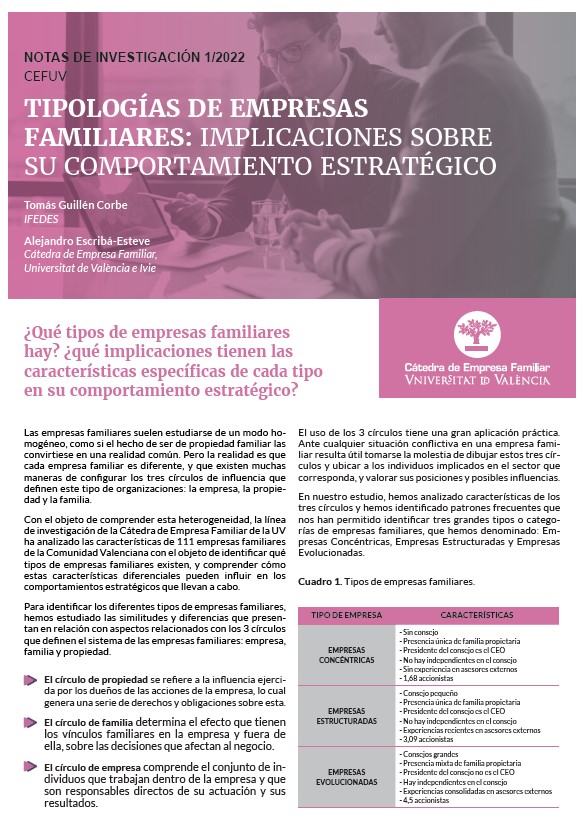
Types of Family Businesses: Implications for their strategic behavior.
Guillén Gorbe, Tomás (Grupo IFEDES) Escribá-Esteve, Alejandro (CEFUV - Universitat de València / Ivie)
Valencia , 2022. Recurs electrònicWhat types of family businesses are there? What implications do the specific characteristics of each type in its strategic behavior? This research note addresses these questions. The full study is published in Guillén Gorbe, T., & Escribá-Esteve, A. (2021). Heterogeneity in Family Firms: exploring governance configurations and their effect on strategies. Harvard Deusto Business Research, X(1), 26-52. https://doi.org/10.48132/hdbr.334
-
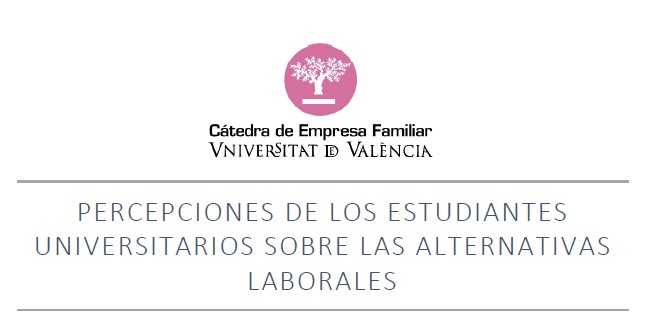
Family Businesses as a potential employer.
Sara Cardona; Alejandro Escribá.
(2022). Projecte fi de grauData about the family firm as an employing entity.
-
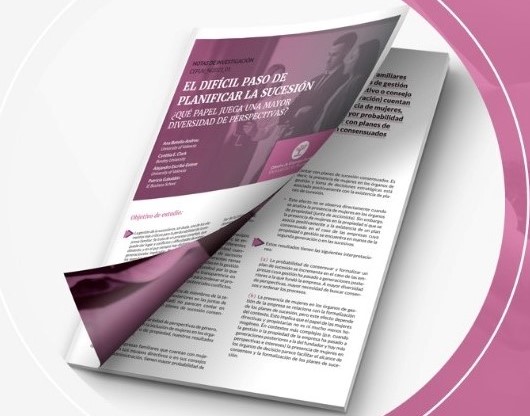
El difícil paso de planificar la sucesión: ¿Qué papel juega una mayor diversidad de perspectivas?
Ana Botella (Universidad de València) Cynthia E. Clark (Universidad de Bentley) Patricia Gabaldón (IE Business School) Alejandro Escribá (Universidad de Valencia e IVIE)
(2021). Recurs electrònic -
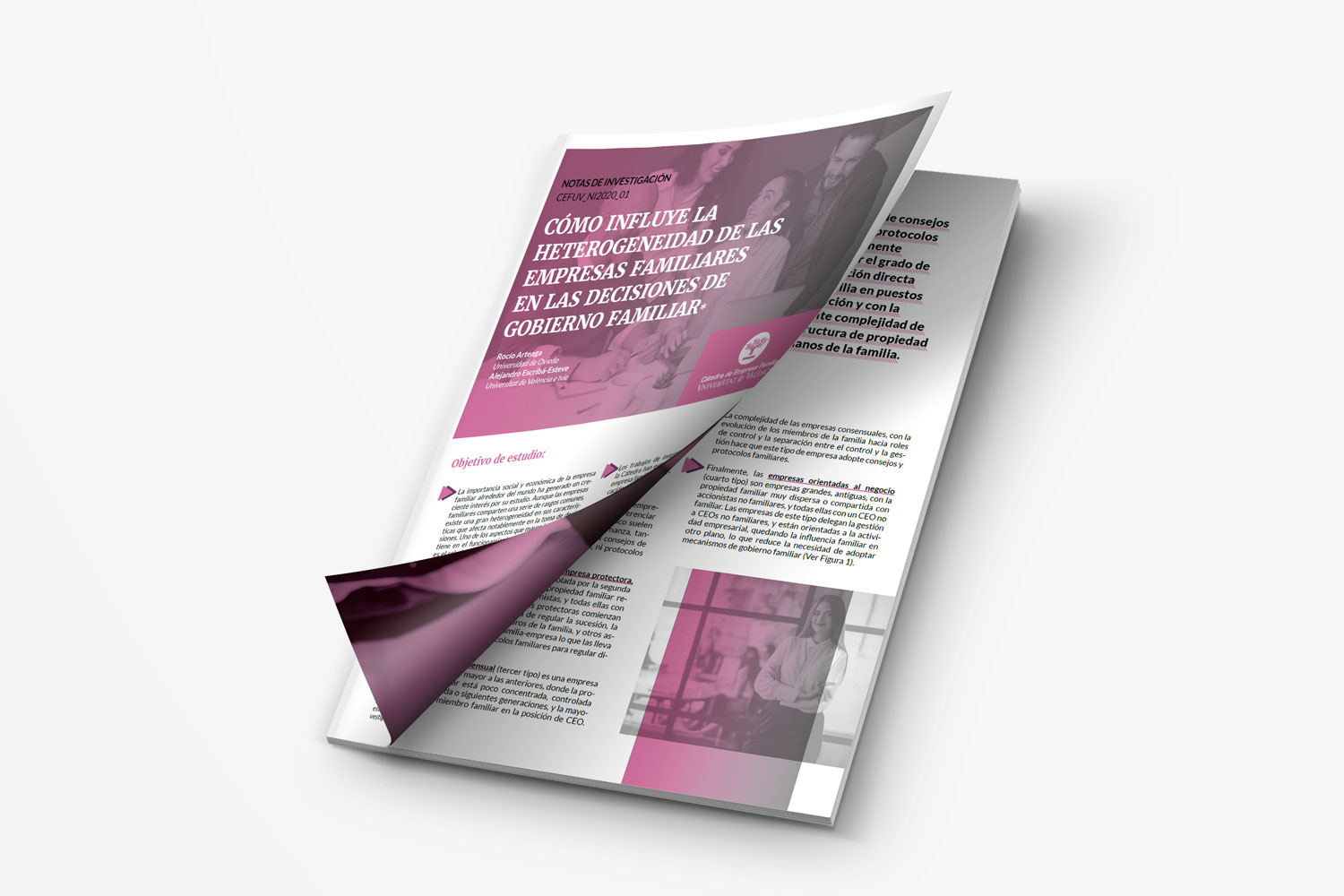
"How Family Business’ Heterogeneity influences family governance decisions".
Rocío Arteaga ((University of Oviedo) Alejandro Escribá (University of Valencia and IVIE).
(2020). Recurs electrònic -
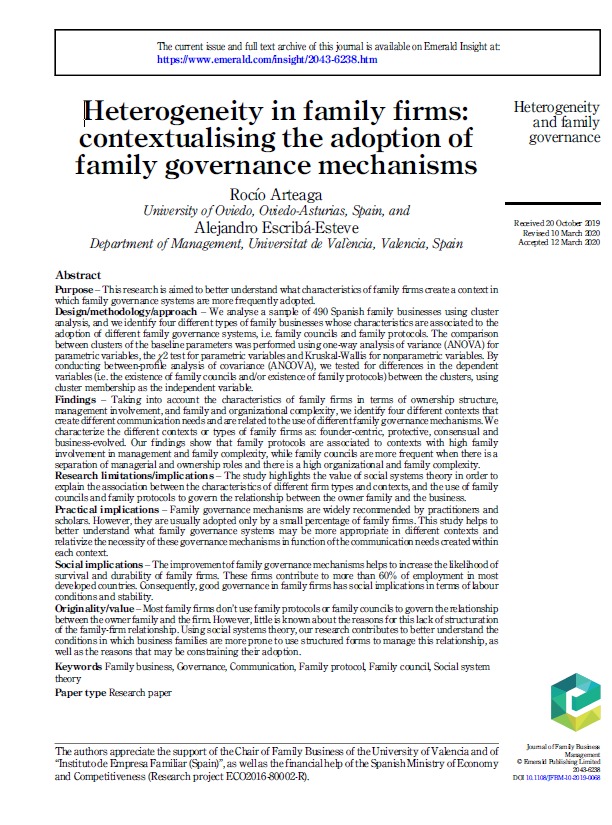
Heterogeneidad en las empresas familiares: Contextualizando la adopción de mecanismos de Gobierno Familiar.
Arteaga, Rocío; Escriba-Esteve, Alejandro
(2020). ArticleThis research is aimed to better understand what characteristics of family firms create a context in which family governance systems are more frequently adopted. Taking into account the characteristics of family firms in terms of ownership structure, management involvement, and family and organizational complexity, we identify four different contexts that create different communication needs and are related to the use of different family governance mechanisms. We characterize the different contexts or types of family firms as: founder-centric, protective, consensual, and business-evolved. Our findings show that family protocols are associated to contexts with high family involvement in...
This research is aimed to better understand what characteristics of family firms create a context in which family governance systems are more frequently adopted. Taking into account the characteristics of family firms in terms of ownership structure, management involvement, and family and organizational complexity, we identify four different contexts that create different communication needs and are related to the use of different family governance mechanisms. We characterize the different contexts or types of family firms as: founder-centric, protective, consensual, and business-evolved. Our findings show that family protocols are associated to contexts with high family involvement in management and family complexity, while family councils are more frequent when there is a separation of managerial and ownership roles and there is a high organizational and family complexity. The study highlights the value of social systems theory in order to explain the association between the characteristics of different firm types and contexts, and the use of family councils and family protocols to govern the relationship between the owner family and the business. Family governance mechanisms are widely recommended by practitioners and scholars. However, they are usually adopted only by a small percentage of family firms. This study helps to better understand what family governance systems may be more appropriate in different contexts and relativize the necessity of these governance mechanisms in function of the communication needs created within each context.
Read more Hide -
Nota de investigación 01/2018: El tamaño de la empresa, fuente de competitividad.
Joaquín Juste Méndez y Alejandro Escribà-Esteve.
(2019). Recurs electrònicMediante esta nota de investigación, basada en el informe sobre "caminos para mejorar la competitividad de las empresas valencianas" de la Asociación Valenciana de Empresarios (AVE), pretendemos demostrar la importancia que tiene el tamaño de las empresas para la competitividad y la productividad de esta.








